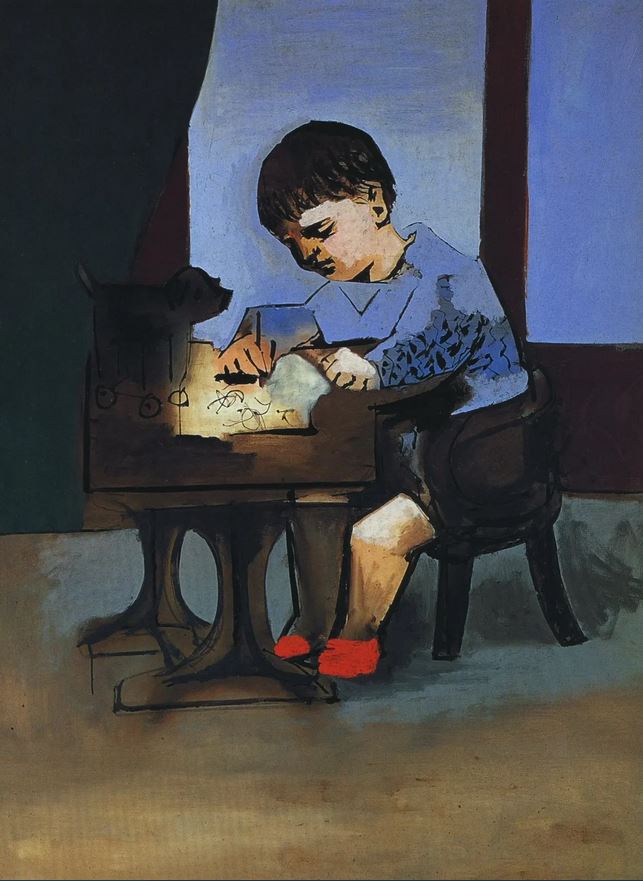by Giuseppa Brena (June 2023)
Translated from the Italian by James Tetreault

Paulo Draws, Pablo Picasso, 1923
“My grandmother used to say— ” began Grandma Laura, and little Luigi interrupted:
“—What! Did you have a grandma too?”
“Of course. Everybody has—or had—a grandma, maybe up in heaven, if so many years have gone by.”
“But you’re already a grandma, and you’re very old, how could you have a grandma?”
It was hard to explain the passage of generations to a small child. Then there was that “very old” that irked her at age seventy-eight and at the same time made her smile. For Laura herself, when she turned her mind to the distant past, the memories, especially if recounted aloud, seemed to blossom like fairy tales, making her re-live a life filled with a beautiful sense of sheer uninterrupted existence. But her grandson wanted his answer:
“Well, Grandma?”
“I was once a child too, and my grandma, whose name was Nina, was not as old as I am now. Then I grew up and she grew older and she died.”
“Did she go to heaven with the Baby Jesus?”
“Of course.”
What pleased Grandma Laura about these talks with her grandson was that he liked to talk about Jesus with her, even though he had no religious instruction at home.
“What about your grandpa?”
“My grandpa died before I was born.”
“But I,” said the child, “I still have two grandmas and two grandpas, and Grandpa Marco always tells me stories about Ulysses.”
This was the father of her daughter-in-law, who would assert with a certain emphasis that her father did not know any stories for children and so he told tales he remembered from his classical studies. But the child—who would have expected this? —delighted in his tales and proudly told everyone about them.
“Grandma, will you tell me stories about Ulysses too?”
“I’ll be glad to.”
Consider the twistings and turnings of life! She too as a child used to ask her grandma Nina for stories about Ulysses, and Nina would tell them to her. As she grew older, in school Laura came to realize that these versions were somewhat modified from the authentic tales, and the authentic ones in fact were better still.
But do you know whom Grandma Nina had learned them from? She had learned them from her grandmother, and most of the time the tales came with an introduction that both astonished and enchanted Laura.
“I was a poor girl, “ said Grandma Nina, “and I didn’t go to school for long because I would’ve had to go a long ways and we didn’t have any money. My grandmother had been a teacher but then her legs became paralyzed. This meant she couldn’t move by herself. I was only a girl of ten or eleven, but I was sturdy, and so I would carry her around on my shoulders. She was slight and didn’t weigh much, and her two legs would dangle in front like a stuffed doll’s.”
Can you imagine a little girl with a little old woman on her shoulders? At those times Laura would look at her grandmother with pride and would imagine herself walking around the mountain village as if she had a talking backpack on her shoulders.
“Every once in a while,” went on Grandma Nina, “we would stop in front of a crucifix or a shrine, and I would set grandma up on a wall, and she would have me say a prayer. That’s how I learned a lot of prayers from her.”
And Grandma Laura added: “Grandma Nina taught these prayers to us, her grandchildren.” I remember one prayer that began this way: “Hail, refuge of the human race …
“Then what?” interrupted Luigi, who was enthralled by these stories.
“I don’t remember any more of it. However, we did say ordinary prayers too, like the Our Father and the Hail Mary.
“Can you tell me the one about Dad?”
Obviously by this he meant the Our Father, not his own father. The grandmother began it, but she was soon interrupted by the child.
“This one is kind of hard.”
“Well, all right, you can simply say: God, You who are our Father, protect us, help us, and love us.”
“And keep my grandma well,” added the clever little fellow, as the family called him.
The grandmother felt her heart leap for joy and emotion.
“Luigi, you know I love you so much.”
“Do you love everybody?”
“Yes, of course, but do you know who I love more than anybody?”
The grandmother was expecting to hear “Me,” but instead she heard: “Jesus.”
“Why do you say that?”
“Because Jesus loves you so much, and so you love him too.”
Inexpressible the joy and emotion of the grandmother. She felt pleasure that she could still give something to her grandchildren. Indeed, yes! Like her grandmother, like the grandmother of her grandmother. A seed that had been planted and was making a new plant. And she, Grandmother Laura, prayed to God that this plant would bear ample fruit.
Table of Contents
Giuseppa Brena lives with her husband on the shore of Lake Garda in northern Italy; her two children and three grandchildren live in nearby cities. This story is from a collection of thirty-five published in Italy, entitled Nonni e Nipoti (Grandparents and Grandchildren).
Follow NER on Twitter @NERIconoclast
- Like
- Digg
- Del
- Tumblr
- VKontakte
- Buffer
- Love This
- Odnoklassniki
- Meneame
- Blogger
- Amazon
- Yahoo Mail
- Gmail
- AOL
- Newsvine
- HackerNews
- Evernote
- MySpace
- Mail.ru
- Viadeo
- Line
- Comments
- Yummly
- SMS
- Viber
- Telegram
- Subscribe
- Skype
- Facebook Messenger
- Kakao
- LiveJournal
- Yammer
- Edgar
- Fintel
- Mix
- Instapaper
- Copy Link









